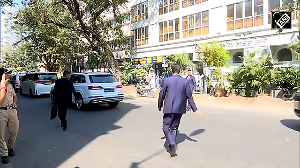Meeting Pakistan Premier Yousuf Raza Gilani a couple of hours after his discussions with Singh, Obama is believed to have asked him to bring the perpetrators of the Mumbai terrorist attacks to justice, saying this action would be a positive thing in improving Indo-Pak ties.
Gilani replied in the affirmative when asked by reporters whether some action can be expected from Pakistan now that Obama is pressing it to bring those behind Mumbai attacks to justice. "Certainly," he said, adding "I am against terrorism and always of the opinion that those who are the culprits, they should be brought to justice."
Briefing reporters on the 50-minute meeting at Blair House between the two leaders, Foreign Secretary Nirupama Rao said Singh made it clear that "future of South Asia would be determined by the manner in which terrorism is tackled". The Prime Minister also voiced apprehensions about misuse of US military supplies to Pakistan, prompting Obama to assure him that India's concerns in this regard would be kept in mind while dealing with the issue.
Obama also said he favoured reduction of tensions between India and Pakistan. The US President told Singh that Washington was "supportive" of India's request for access to Mumbai attacks accused and Lashkar-e-Tayiba operative David Headley and it was "working through legal systems" on the matter.
Obama said the US understood India's concerns with regard to activities of Lashkar-e Taiba and other terror groups from Pakistan and Afghanistan and that Washington was "engaging" Pakistan on these issues. While talking about the menace of terrorism emanating from Pakistan, Singh referred to Headley, activities of LeT and its chief Hafiz Mohd Saeed and al-Qaeda-linked HuJI leader Ilyas Kashmiri, Rao said.
"Unfortunately, there is no will on part of Pakistan to punish those responsible for terrorist attacks in Mumbai," Rao quoted the Prime Minister as telling Obama. "This is where partnership of India and the US could make the difference," Singh told Obama. The Prime Minister said there had been "tremendous rise" in infiltration from Pakistan. While seeking the US' cooperation in putting pressure on Pakistan, Singh said India and the US stood on the same side on the issue of dealing with terrorism.
"The terrorist onslaught in our region, if persisted, could affect our economic growth," Singh told Obama while underlining the need for tackling the issue of terrorism. "How this menace is tackled will determine the future of the South Asian region," he said, specifically referring to happenings in Pakistan and Afghanistan.
To a question, Rao said the fate of Indo-Pak dialogue had no connection with today's meeting between Singh and Obama. She said the US as also the entire world was aware of India's approach on dialogue with Pakistan. "The US fully understands" India's position on the dialogue, she said. India has suspended composite dialogue since the 26/11 attacks and has refused to resume it till Pakistan takes concrete and transparent action against those behind the terror strikes.
Rao said there would be no meeting between Singh and Gilani here during the Nuclear Security Summit, but did not categorically rule out such a possibility in Bhutan during the upcoming SAARC meet.
The two leaders, while reviewing the Indo-US ties, expressed satisfaction at the "good progress" made in the relations since they met last in November 2009 in Washington.They said they were looking forward to the strategic dialogue to be held between the two countries on June 3. External Affairs Minister S M Krishna will be visiting Washington for that purpose.




